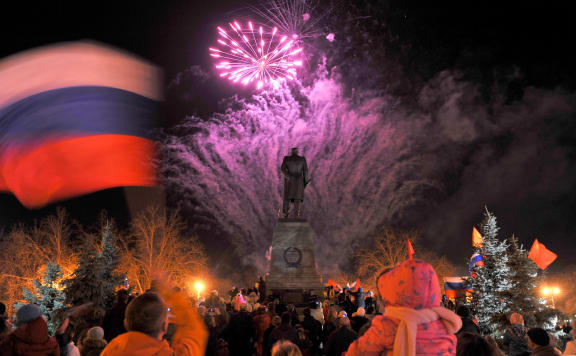The European Union has named 12 Russians to be targeted by new sanctions aimed at the President, Vladimir Putin's, inner circle, as a result of the crisis in Ukraine.
The move came on the day Mr Putin signed a law formalising Russia's annexation of Crimea from Ukraine. The Russian Foreign Ministry says the sanctions are "divorced from reality".
There were further celebrations in the Crimean capital over the incorporation into Russian leader Vladimir Putin signed a law formalising Crimea's annexation on Friday, despite EU and United States sanctions.

A man waves a Russian flag in Sevastopol as fireworks mark the incorporation of Crimea into the Russian federation. Photo: VIKTOR DRACHEV / AFP
The Russian foreign minister, Sergei Lavrov, says it was clear the move reflected the will of the Crimean people.
Meanwhile the 57-member Organisation for Security and Co-operation in Europe, which includes both Russia and the European Union, has agreed to send an international monitoring mission to Ukraine.
The 100-strong monitoring team will be deployed around the country, including to Russian-speaking areas in the east, but it's not expected to go to Crimea. An earlier OSCE delegation was denied entry in the days before the referendum in which Crimeans voted for incorporation into Russia.
The Russian Foreign Ministry says Moscow hopes the mission will help resolve what it calls an "internal Ukrainian crisis".
The European security organisation was to send advance teams within a day. The mission could be expanded by an additional 400 monitors.
It comes as EU ministers, meeting in Brussels, signed an agreement on closer political cooperation with Kiev. A similar agreement was rejected by the former president of Ukraine, Viktor Yanukovich, which led to the bloody uprising that culminated in his ousting.
US reviews use of Russian engines
Meanwhile, as tensions soar with Moscow, the Pentagon is reviewing whether relying on Russian rocket engines for United States military satellite launches poses a potential national security risk.
Since 1995, the US military has used the Russian-made engines on Atlas V rockets, which are often employed to send Air Force and other satellites into space.
The Pentagon says it is carrying out the review given the crisis over Ukraine.
It says if the Atlas V with its Russian engines were scrapped, it would take up to five years and as much as $US1 billion to replace.

